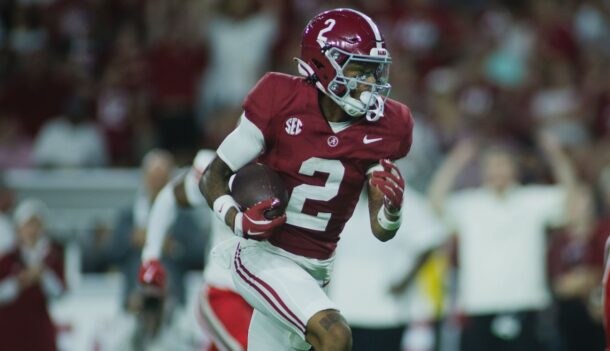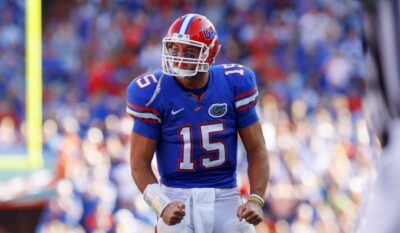Like any source of entertainment, college football is predicated not just on tradition and pageantry, but on the iconic superstars whose names and careers are now immortalized in the eyes of fans everywhere.
These aren’t just the talented players and coaches who passed through the college game over the years; these are the “drop everything and turn on the game because so-and-so is in action” guys, the players who transcended the sport, whose legends may never be topped.
Which makes replacing these kinds of talents one of the most difficult tasks in sports. In more than 80 years of SEC football, there have been plenty of players and coaches who reached this level of iconic stardom, but eventually each of them had to be replaced.
As we look back and appreciate the history of our great conference, let’s look at a few of the names who replaced the titans of SEC football since 1932. Few could live up to the legacies of their predecessors, but there were more productive players and coaches among the group than you’d think.
PLAYERS
BRENT FULLWOOD
Who’d he replace: Bo Jackson
How’d he fare: In his first three years at Auburn, Fullwood ran for a combined 1,398 yards as a backup to Jackson, the best back in the country at the time. When Bo moved on from Auburn as the No. 1 overall pick in the 1986 draft and as a pro baseball player, Fullwood had one year to prove his worth as Auburn’s starter. He made the most of his year, rushing for 1,391 yards to nearly match his career total in that season alone. He added 10 touchdowns, and may be among the most forgotten consensus All-Americans in SEC history, even finishing sixth in that year’s Heisman balloting.
BARRY YOUNG
Who’d he replace: Herschel Walker
How’d he fare: Young was presented with the task of filling in for the previous year’s Heisman winner in Walker, a player who earned All-American honors in each of his three years in Athens. He was one of two players to rush for at least 500 yards as Georgia used a committee of backs to replace Walker, but considering Young had backed up Walker for three years and had one year left to shine as a Bulldog, we’re considering him the replacement. He averaged 4.4 yards per carry, which isn’t bad, and he only ran for four touchdowns among his 115 carries.
TEE MARTIN
Who’d he replace: Peyton Manning
How’d he fare: Manning is now regarded as one of the greatest quarterbacks of all-time at any level of the game (especially the NFL), and when he graduated from Tennessee after the 1997 season many expected the Vols’ offense to regress. After all, Manning had just won the 1997 Maxwell Award and finished second in Heisman voting before becoming the No. 1 overall pick of the 1998 NFL draft. He was replaced by Tee Martin, who promptly led Tennessee to the first-ever BCS national championship game, which he won in his first year as UT’s starter. His numbers were far below Manning’s, as Martin threw for only 2,100 yards (he did run for seven touchdowns and only threw six picks all year), but he achieved greater success than Manning ever did in Knoxville.
JOHN BRANTLEY
Who’d he replace: Tim Tebow
How’d he fare: Tebow may very well be the greatest SEC football player of the 2000s, and he’s certainly one of the best quarterbacks, along with one-year phenom and former Tebow backup Cam Newton. After winning two national titles and a Heisman at Florida, Tebow left for the NFL and was replaced by former Gatorade High School National Player of the Year John Brantley. Unfortunately, Brantley’s best days came in high school, as he accounted for 20 touchdowns against 17 picks in his two years as the Gators’ starter in 2010-11. He was the anti-Tebow with his legs, rushing for minus-231 yards in two years, and while he completed 60 percent of his throws he only averaged 2,300 yards a year through the air. Florida was 15-11 Brantley’s two years, an obvious regression from the days of Tebow.
DUSTY BONNER
Who’d he replace: Tim Couch
How’d he fare: Tim Couch posted passing numbers hardly ever before seen at the college level, thanks to the introduction of Hal Mumme’s Air Raid offense in the Bluegrass. In two years as a starter in 1997-98, Couch attempted exactly 1,100 passes and threw for more than 8,100 yards and 73 touchdowns (he did also throw 34 picks in that time). He was an All-American in 1998 and the No. 1 overall pick in the 1999 NFL draft. He was replaced at UK by Dusty Bonner, whose numbers also benefitted from the Air Raid system. In one year as a starter in 1999 he threw for 3,200 yards and 26 touchdowns against 13 picks, completing 65 percent of his throws in the process (a better percentage than Couch). Still, he never dominated opponents through the air quite like Couch did in his prime at UK, and the Cats failed to reach a bowl in Bonner’s ’99 campaign.
COACHES
RON ZOOK
Who’d he replace: Steve Spurrier
How’d he fare: Remember how big a deal FireRonZook.com was back in the day? Now, creating your own website is a bit simpler, but for someone to go to those lengths a decade ago indicated just how bad Zook flopped as the Head Ball Coach’s replacement. In three years at Florida (2002-04), he was 23-14 and 16-8 in SEC play. Zook’s teams finished ranked in the coaches’ poll after all three seasons and he even won a share of the SEC East title in 2003. But he lost more home games in three years at Florida than Spurrier did in 12, and he never won more than eight games in a season, which fell well below the standard that Spurrier set. It’s not that Zook was a terrible coach, but he had to replace a legend at a program with lofty annual expectations. That’s the perfect storm for disaster, or, you know, a spiteful website.
RAY PERKINS
Who’d he replace: Paul “Bear” Bryant
How’d he fare: Logic told us Bryant had to retire eventually, and when he did it was a sad day in Tuscaloosa. He was replaced in 1983 by Ray Perkins, who’d spent the last four years coaching the NFL’s New York Giants to a combined 23-34 record with only one winning season in that time. In 1984 he posted Alabama’s first losing season since 1957, the year before Bryant arrived, but he won eight games his first season on the job, nine in 1985 and 10 in 1986 before the Tampa Bay Buccaneers threw enough money his way to sway him back to the NFL in 1987. Prior to the 2012 BCS national championship game, Perkins was the only Alabama coach for nearly 30 years to defeat Notre Dame, and he was 3-0 in bowl games with three top-15 finishes in season-ended Associated Press polls.
HARVEY ROBINSON
Who’d he replace: General Robert Neyland
How’d he fare: When Neyland finally retired from coaching for good in 1952 due to health concerns, he was replaced by Robinson, who was 10-10-1 in two seasons as head coach before finding himself out of a job. He was 6-4-1 in 1953, good for a seventh-place finish in the final SEC standings, then went 4-6 in 1954 and finished 11th in the conference. Robinson eventually returned to UT as an assistant to head coach Bowden Wyatt.
RAY GOFF
Who’d he replace: Vince Dooley
How’d he fare: When Dooley retired from coaching, he was still the athletics director at Georgia, enabling him to hire his own replacement. Goff lasted seven seasons on the job, but only won more than six games in a season twice. He won nine games in 1991 and finished No. 17 in the final AP poll, then won 10 games the following year, winning a share of the SEC East crown and finishing in the top 10 of the final AP rankings. However, aside from those two years, Goff was only 27-29-1, and he was only 2-2 in bowl games during his seven-year tenure, a far cry from the success of Dooley’s Dawgs in the 1980s.
BILLY KINARD
Who’d he replace: Johnny Vaught
How’d he fare: Vaught, now part of the namesake of Ole Miss’ Vaught-Hemingway Stadium, relinquished his coaching duties after the 1970 season. He was replaced by Kinnard, who began his tenure with a bang, finishing 10-2 in 1971 with a Peach Bowl victory. However, his Rebels regressed to 5-5 the next year as the program moved further from the Vaught era, and when he began the 1973 season with a 1-2 record, Vaught, who’d been hired as AD just months earlier, replaced Kinard with himself. The Rebels closed the year with a 5-3 record under Vaught, indicating Kinard may not have had what it took to win in the SEC.
A former newspaper reporter who has roamed the southeastern United States for years covering football and eating way too many barbecue ribs, if there is such a thing.







